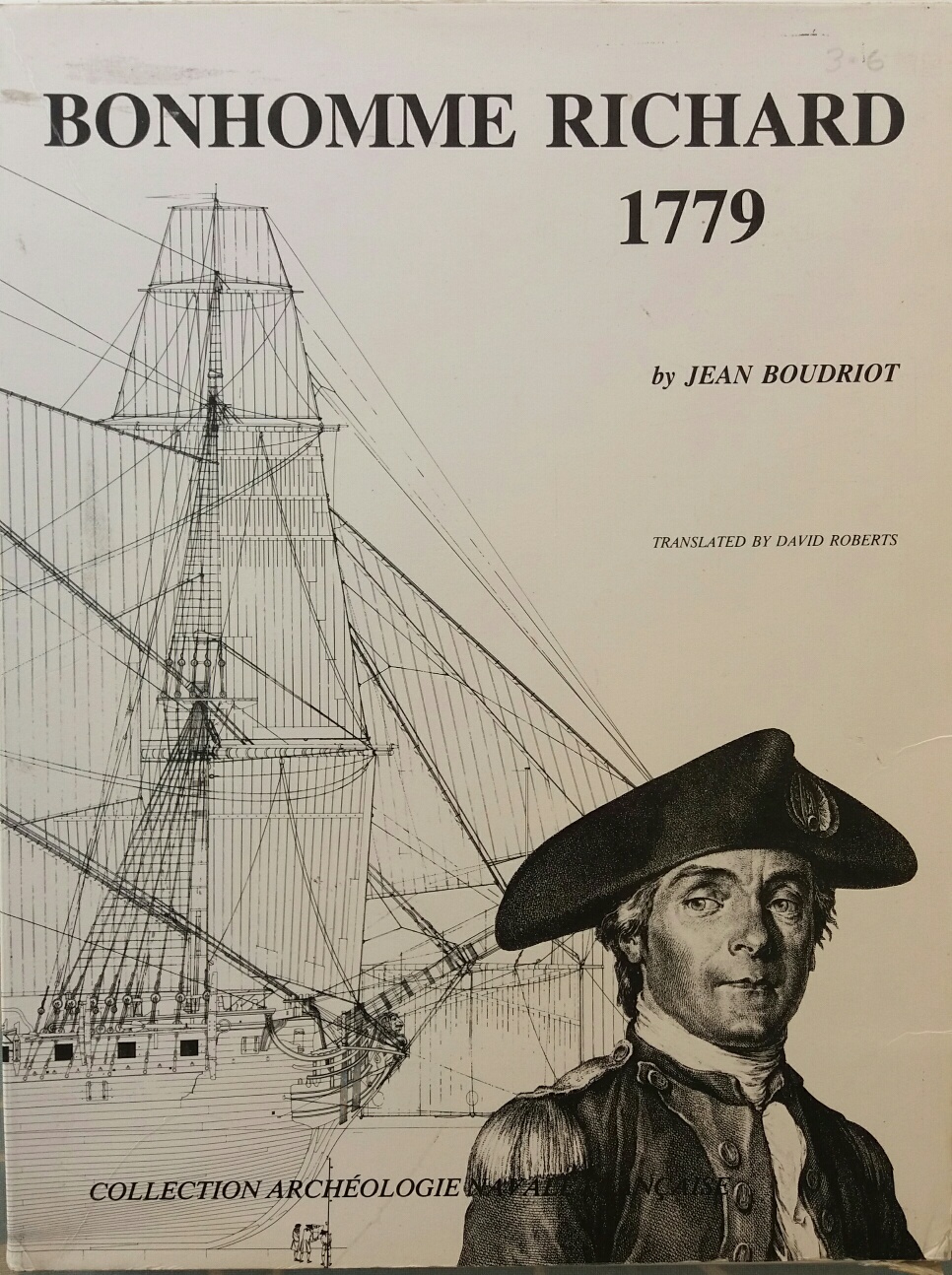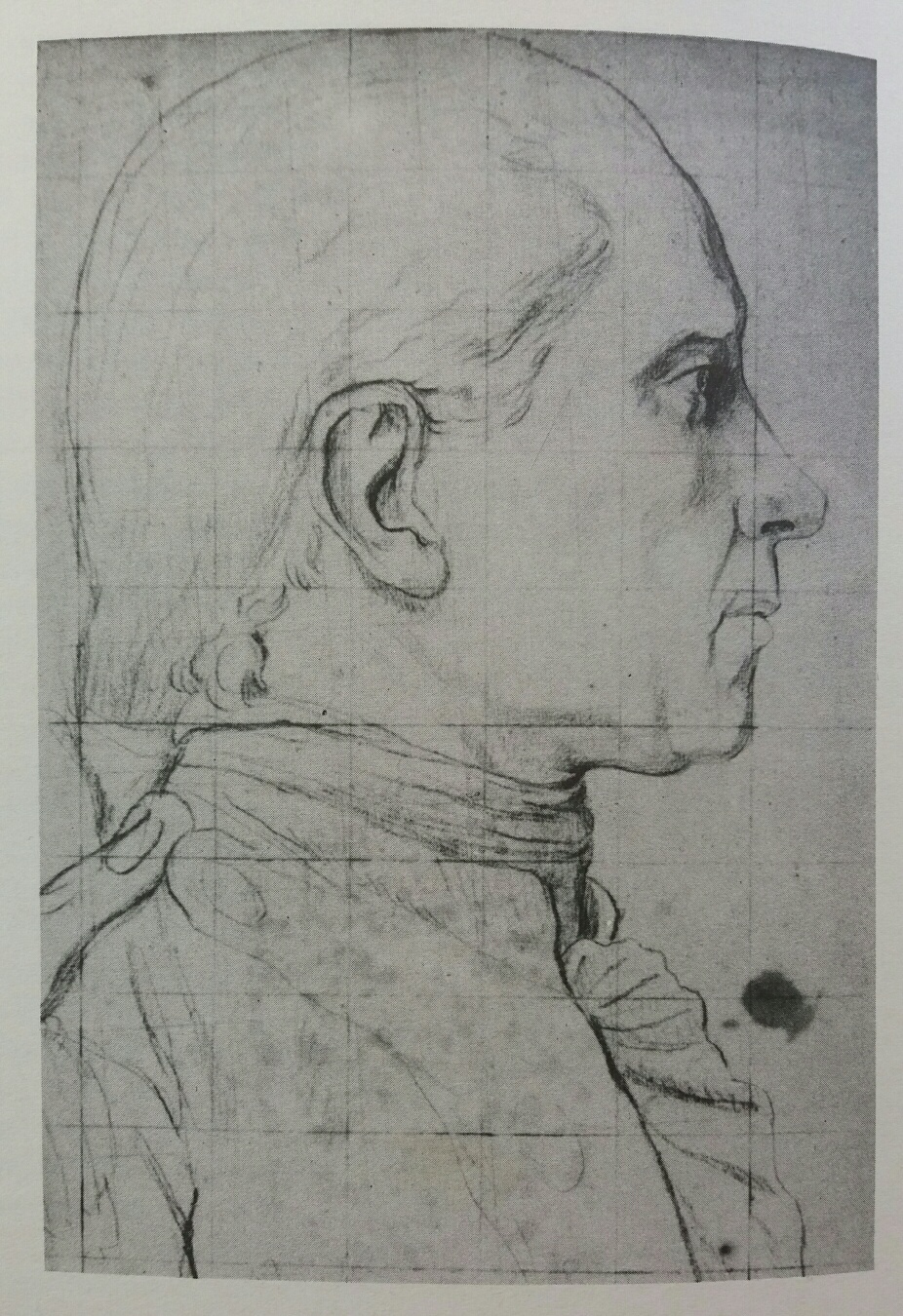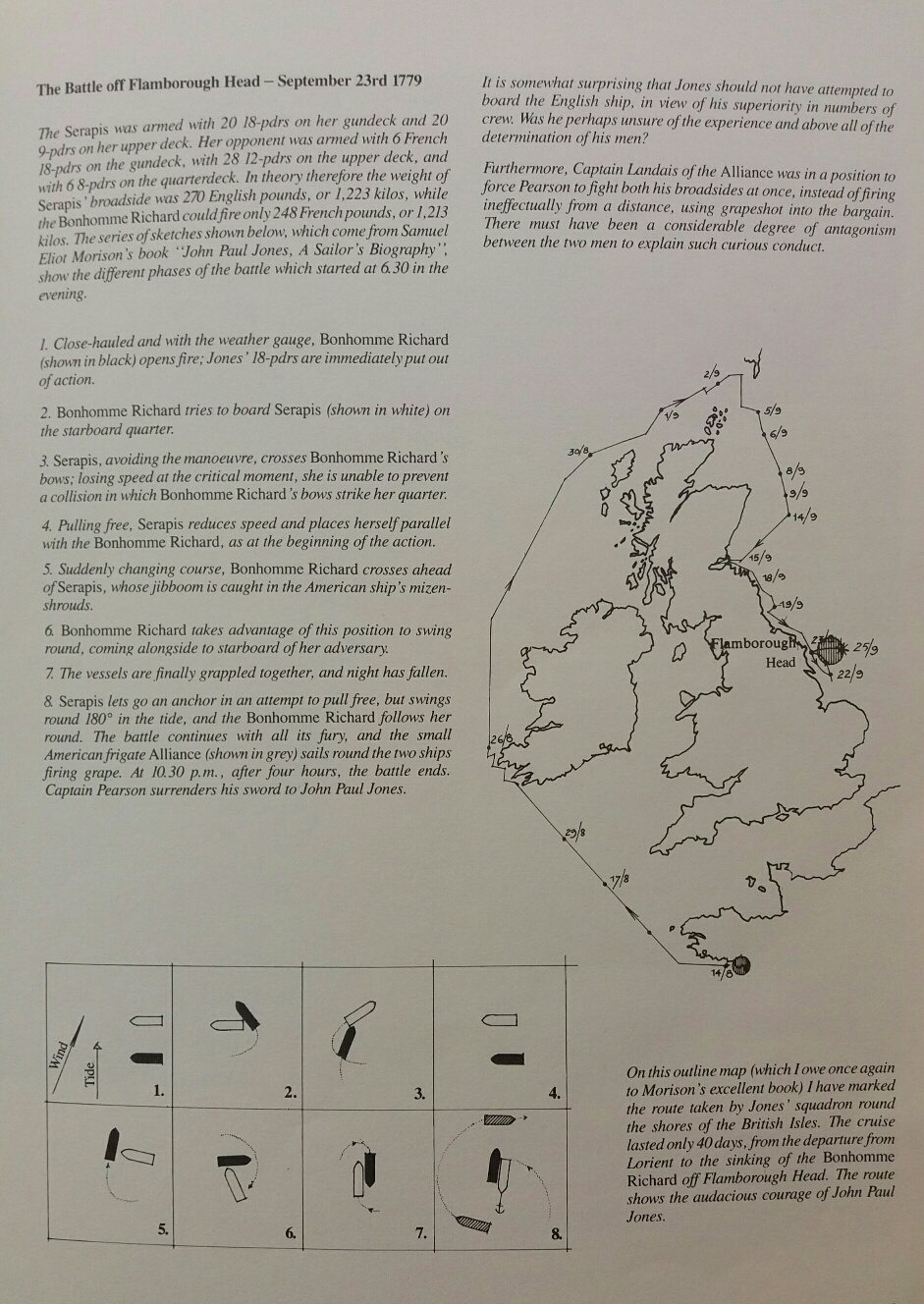Some extracts from the Family magazine, Volume 3, about John Paul Jones
John Paul was born at Arbigland, in Scotland, on the sixth of July, 1747, and the scenery and associations of his birthplace, and its vicinity, doubtless, encouraged a restless spirit of adventure, a love of change, and an ardent enthusiasm in the objects of his pursuits, which were so strikingly manifested in his life. His first voyage was made before he was thirteen years old; and maritime pursuits brought him to America. While here his feelings became interested in the cause of the colonies, and fully prepared him for the active part he afterward took in their defence. In 1773, John Paul removed to Virginia, to attend to the affairs of his brother who had died childless and intestate. He now assumed the additional surname of Jones. On the twenty-second of December, 1775, by a resolution of Congress, Paul Jones was appointed lieutenant in the American Navy, which then consisted of the Alfred, Columbus, Andrew Doria, Sebasiian Cabot, and Providence; the whole mounting one hundred guns, and manned by eleven hundred and fifty seamen; Jones was attached to the Alfred, and was the first to hoist the American flag, which was first displayed on board that vessel. On the twenty-second of February, 1778, he thus wrote to the Marine committee:
"I am happy in having it in my power to congratulate you on my having seen the American flag, for the first time, recognised, in the fullest and completest manner by the flag of France."
In April, 1778, his memorable visit to White Haven occurred. Time would fail us were we to recount all the various acts of bravery performed by Jones. But we must hasten to one of the bravest actions, in which Jones was ever engaged, and which we shall give in his own words, as contained in his life and correspondence, edited by Miss Jeanette Taylor.
His official account of the battle between the Bon Homme Richard and the Serapis, is as follows :
"On the 21st, we saw and chased two sail off Flamborough Head; the Pallas chased in the N. E. quarter, while the Bon Homme Richard, followed by the Vengeance, chased in the S. W.; the one I chased, a brigantine collier in ballast, belonging to Scarborough, was soon taken, and sunk immediately afterward, as a fleet then appeared to the southward. This was so late in the day, that I could not come up with the fleet before night; at length, however, I got so near one of them as to force her to run ashore between Flamborough Head and the Spurn. Soon after I took another, a brigantine from Holland, belonging to Sunderland, and at daylight next morning, seeing a fleet steering towards me from the Spurn, I imagined them to be a convoy bound from London for Leith, which had been for some time expected. One of them had a pendant hoisted, and appeared to be a ship of force. They had not, however, courage to come on, but kept back, all except the one which seemed to be armed, and that one also kept to the windward, very near the land, and on the edge of dangerous shoals, where I could not with safety approach. This induced me to make a signal for a pilot, and soon afterward two pilot-boats came off. They informed me that a ship that wore a pendant was an armed merchantman, and that a king's frigate lay there in sight, at anchor, within the Humber, waiting to take under convoy a number of merchantships bound to the northward. The pilots imagined the Bon Homme Richard to be an English ship-of-war, and consequently communicated to me the private signal which they had been required to make. I endeavoured by this means to decoy the ships out of the port; but the wind then changing, and with the tide, becoming unfavourable for them, the deception had not the desired effect, and they wisely put back. The entrance of the Humber is exceedingly difficult and dangerous, and as the Pallas was not in sight, I thought it imprudent 10 remain off the entrance; therefore steered out again to join the Pallas off Flamborough Head. In the night we saw and chased two ships until three o'clock in the morning, when, being at a very small distance from them, I made the private signal of reconnoissance, which I had given to each captain before I sailed from Groix: one half of the answer only was returned. In this position both sides lay to till daylight, when the ships proved to be the Alliance and the Pallas.
"On the morning of that day, the 23rd, the brig from Holland not being in sight, we chased a briganline that appeared laying to, to windward. About noon, we saw and chased a large ship that appeared coming round Flamborough Head, from the northward, and at the same time I manned and armed one of the pilot boats to send in pursuit of the brigantine, which now appeared to be the vessel that I had forced ashore. Soon after this, a fleet of forty-one sail appeared off Flamborough Head, bearing N. N. E. This induced me to abandon the single ship which had then anchored in Burlington Bay; I also called back the pilot boat, and hoisted a signal for a general chase. When the fleet discovered us bearing down, all the merchant ships crowded sail toward the shore. The two ships of war that protected the fleet at the same time steered from the land, and made the disposition for battle. In approaching the enemy, I crowded every possible sail, and made the signal for the line of battle, to which the Alliance showed no attention. Earnest as I was for the action, I could not reach the commodore's ship until seven in the evening, being then within pistol-shot, when he hailed the Bon Homme Richard. We answered him by firing a whole broadside.
"The battle being thus begun, was continued with unremitting fury. Every method was practised on both sides to gain an advantage, and rake each other; and I must confess that the enemy's ship, being much more manageable than the Bon Homme Richard, trained thereby several times an advantageous situation, in spite of my best endeavours to prevent it. As I had to deal with an enemy of greatly superiour force, I was under the necessity of closing with him, to prevent the advantage which he had over me in point of manoeuvre. It was my intention to lay the Bon Homme Richard athwart the enemy's bow; but as that operation required great dexterity in the management of both sails and helm, and some of our braces being shot away, it did not exactly succeed to my wish. The enemy's bowsprit, however, came over the Bon Homme Richard's poop, by the mizzenmast, and I made both ships fast together in that situation, which by the action of the wind on the enemy's sails, forced her stern close to the Bon Homme Richard's bow, so that the ships lay square alongside of each other, the yards being all entangled, and the cannon of each ship touching the opponents. When this position took place, it was eight o'clock, previous to which the Bon Homme Richard had received sundry eighteen-pound shots below the water, and leaked very much. My battery of twelve-pounders, on which I had placed my chief dependance, being commanded by Lieutenant Dale and Colonel Weibert, and manned principally with American seamen and French volunteers, was entirely silenced and abandoned. As to the six old eighteen-pounders that formed the battery of the lower gun-deck, they did no service whatever, except firing eight shots in all. Two out of three of them burst at the first fire, and killed almost all the men who were stationed to manage them. Before this time, too, Colonel de Chamillard, who commanded a party of twenty soldiers on the poop, had abandoned that station after having lost some of his men. I had now only two pieces of cannon, (nine-pounders,) on the quarter-deck, that were not silenced, and not one of the heavier cannon was fired during the rest of the action. The purser, M. Mease, who commanded the guns on the quarter-deck, being dangerously wounded in the head, I was obliged to fill his place, and with great difficulty rallied a few men, and shifted over one of the lee quarter-deck guns, so that we afterward played three pieces of nine-pounders upon the enemy. The tops alone seconded the fire of this little battery, and held out bravely during the whole of the action, especially the maintop, where Lieutenant Stack commanded. I directed the fire of one of the three cannon against the mainmast, with doubleheaded shot, while the other two were exceedingly well served with grape and cannister-shot, to silence the enemy's musketry and clear her decks, which was at last effected. The enemy were, as I have since understood, on the instant of calling for quarter, when the cowardice or treachery of three of my under officers induced them to call to the enemy. The English commodore asked me if I demanded quarter, and I having answered him in the most determined negative, they renewed the battle with double fury. They were unable to stand the deck; but the fire of their cannon, especially the lower battery, which was entirely formed of ten-pounders, was incessant; both ships were set on fire in various places, and the scene was dreadful beyond the reach of language. To account for the timidity of my three under-officers, I mean the gunner, the carpenter, and the master-at-arms, I must observe, that the two first were slightly wounded, and, as the ship had received various shots under water, and one of the pumps being shot way, the carpenter expressed his fears that she would sink, and the other two concluded that she was sinking, which occasioned the gunner to run aft on the poop, without my knowledge, to strike the colours. Fortunately for me, a cannon-ball had done that before, by carrying away the ensign-staff; he was therefore reduced to the necessity of sinking, as he supposed, or of calling for quarter, and he preferred the latter.
"All this time the Bon Homme Richard had sustained the action alone, and the enemy, though much superiour in force, would have been very glad to have got clear, as appears by their own acknowledgements, and by their having let go an anchor the instant that I laid them on board, by which means they would have escaped, had I not made them well fast to the Bon Homme Richard.
"At last, at half past nine o'clock, the Alliance appeared, and I now thought the battle at an end; but, to my utter astonishment, he discharged a broadside full into the stern of the Bon Homme Richard. We called to him for God's sake to forbear firing into the Bon Homme Richard; yet they passed along the off side of the ship, and continued firing. There was no possibility of his mistaking the enemy's ship for the Bon Homme Richard, there being the most essential difference in their appearance and construction. Besides, it was then full moonlight, and the sides of the Bon Homme Richard were all black, while the sides of the prize were all yellow. Yet, for the greater security, I showed the signal of our reconnoissance, by putting out three lanterns, one at the head, another at the stern, and the third in the middle, in a horizontal line. Every tongue cried that he was firing into the wrong ship, but nothing availed; he passed round, firing into the Bon Homme Richard's head, stern, and broadside, and by one of his volleys killed several of my best men, and mortally wounded a good officer on the forecastle. My situation was really deplorable; the Bon Homme Richard received various shots under water from the Alliance ; the leak gained on the pumps, and the fire increased much on board both ships. Some officers persuaded me to strike, of whose courage and good sense I entertain a high opinion. My treacherous master-at-arms let loose all my prisoners without my knowledge, and my prospects became gloomy indeed. I would not, however, give up the point. The enemy's mainmast began to shake, their firing decreased fast, ours rather increased, and the British colours were struck at half an hour past ten o'clock.
"This prize proved to be the British ship of war, the Serapis, a new ship of forty-four guns, built on the most approved construction, with two complete batteries, one of them of eighteen-pounders, and commanded by the brave Commodore Richard Pearson. I had yet two enemies to encounter, far more formidable than the Britons, I mean fire and water. The Serapis was attacked only by the first, but the Bon Homme Richard was assailed by both; there was five feet water in the hold, and though it was moderate from the explosion of so much gunpowder, yet the three pumps that remained could with difficulty only keep the water from gaining. The fire broke out in various parts of the ship, in spite of all the water that could be thrown in to quench it, and at length broke out as low as the powder-magazine, and within a few inches of the powder. In that dilemma, I took out the powder upon deck, ready to be thrown overboard at the last extremity, and it was ten o'clock the next day, the 24th, before the fire was entirely extinguished. With respect to the situation of the Bon Homme Richard, the rudder was cut entirely off, the stern-frame and transoms were almost entirely cut away, and the timbers by the lower deck, especially from the mainmast toward the stern, being greatly decayed with age, were mangled beyond my power of description, and a person must have been an eyewitness to form a just idea of the tremendous scene of carnage, wreck, and ruin, which everywhere appeared. Humanity cannot but recoil from the prospect of such finished horrour, and lament that war should be capable of producing such fatal consequences.
"After the carpenters, as well as Captain Cottineau and other men of sense, had well examined and surveyed the ship, (which was not finished before five in the evening,) I found every person to be convinced that it was impossible to keep the Bon Homme Richard afloat so as to reach a port, if the wind should increase, it being then only a very moderate breeze. I had but little time to remove my wounded, which now became unavoidable, and which was effected in the course of the night and next morning. I was determined to keep the Bon Homme Richard afloat, and, if possible, to bring her into port. For that purpose, the first lieutenant of the Pallas continued on board with a party of men to attend the pumps, with boats in waiting ready to take them on board, in case the water should gain on them too fast. The wind augmented in the night, and the next day, the 20th, so that it was impossible to prevent the good old ship from sinking. They did not abandon her till after nine o'clock; the water was then up to the lower deck, and a little after ten I saw, with inexpressible grief, the last glimpse of the Bon Homme Richard. No lives were lost with the ship, but it was impossible to save the stores of any sort whatever. I lost even the best part of my clothes, books, and papers; and several of my officers lost all their clothes and effects.
"Having thus endeavoured to give a clear and simple relation of the circumstances and events that have attended the little armament under my command, I shall freely submit my conduct therein to the censure of my superiours and the impartial publick. I beg leave, however, to observe, that the force put under my command was far from being well composed, and as the great majority of the actors in it have appeared bent on the pursuit of interest only, I am exceedingly sorry that they and I have been at all concerned.
"Captain Cottineau engaged the Countess of Scarborough, and took her, after an hour's action, while the Bon Homme Richard engaged the Serapis. The Countess of Scarborough is an armed ship of twenty six-pounders, and was commanded by a king's officer. In the action, the Countess of Scarborough and the Serapis were at a considerable distance asunder; and the Alliance, as I am informed, fired into the Pallas and killed some men. If it should be asked, why the convoy was suffered to escape, I must answer, that I was myself in no condition to pursue, and that none of the rest showed any inclination; not even Mr. Ricot, who had held off at a distance to windward during the whole action, and withheld by force the pilot-boat with my lieutenant and fifteen men. The Alliance, too, was in a state to pursue the fleet, not having had a single man wounded, or a single shot fired at her from the Serapis, and only three-that did execution from the Countess of Scarborough, at such a distance that one stuck in the side, and the other two just touched, and then dropped into the water. The Alliance killed one man only on board the Serapis. As Captain de Cottineau charged himself with manning and securing the prisoners of the Countess of Scarborough, I think the escape of the Baltick fleet cannot so well be charged to his account.
"I should have mentioned, that the mainmast and mizzentopmast of the Serapis fell overboard, soon after the captain had come on board the Bon Homme Richard."


